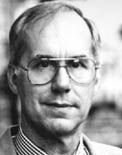1997 – Larry L. Rasmussen
Larry L. Rasmussen, Reinhold Niebuhr Professor of Social Ethics at Union Theological Seminary in New York City, won the 1997 award for the book Earth Community, Earth Ethics. The $150,000 Grawemeyer prize is presented jointly by the Louisville Presbyterian Theological Seminary and the University of Louisville.
Rasmussen shows through the book how the current environmental predicament underscores a variety of crises afflicting modern industrial society: in economics, in politics, in gender and reproductive relationships and in debates about the meaning of life.
Humanity’s future no longer is guaranteed by nature, Rasmussen explains in the preface of his book. He then outlines the different perspectives that scientists and economists have on sustainability and development. He also explores the history of religious concern for the earth — from the ancient Hebrews to Native American traditions; from St. Augustine to Martin Luther to Dietrich Bonhoeffer. Rasmussen makes it clear that Christianity, in particular, has often participated in the destructive path that has brought us to the edge of ecological suicide. But he argues that a re-reading of religious traditions will empower humans to find alternatives to the unsustainable mode of industrialized society.
He contends that fidelity to the earth is not “worshiping dirt,” as some conservatives would see it. Instead, it signals an informed acceptance of ourselves as part of God’s creation. “To embrace earth and live unreservedly in life as it is given us is to land in the arms of God,” he states. “It is to embrace God and be embraced by God, the suffering God. Such living — throwing ourselves into life, embracing earth and its distress — is in fact the way of faith itself.”
Rasmussen is well-known in the theological education and Christian ethics community for his many works on ethics, morality and the history of these issues in Christianity. He serves as co-moderator of the Commission on Justice, Peace and the Integrity of Creation of the World Council of Churches in Geneva.



